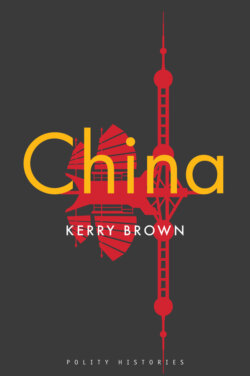China

Реклама. ООО «ЛитРес», ИНН: 7719571260.
Оглавление
Kerry Brown. China
Contents
Guide
Pages
Polity Histories series
China
Abbreviations
Dedication
Acknowledgements
About the Author
1 China’s Arduous March to Modernity
What is China?
China’s Struggle to Catch Up
The Key Chinese Modernizers
Competing Visions: Sun, Chiang, and Mao
Risen from the Ashes: China at War and After
Notes
2 China Reconstructs (1949–1958)
Economic Priorities
Land Reform: China’s Earliest Harvest of Sorrows
Cleansing of the People
China and the World
Notes
3 The Years of Dissent (1958–1966)
The Sino-Soviet Split
Liberalization with Maoist Characteristics
Going to the Moon: The Great Leap Forward
Death in the Countryside: The Great Famines
Four Modernizations: Their First Appearance
Notes
4 The Great Proletariat Cultural Revolution (1966–1976)
Bombard the Headquarters
Smashing the Four Olds
‘Who Hits Me, I Hit Back’: Social Divisions
The Mystery of Lin Biao
Revolution on the Outside: Détente with the United States
Notes
5 Reform and Opening Up (1976–1989)
Ideological Battles in the 1970s: The Three Paths
The Means to Economic Transformation
Crossing the River by Feeling the Stones
Making Money, Losing Faith
Tiananmen Square: The End of the China Dream, Phase One
Notes
6 Starting Over after Tiananmen (1989–2001)
Aftermath of 1989: Steadying the Ship
The Taiwan Strait Issue
The New Narrative: Patriotism and Love of the Chinese Motherland
The Zhu Rongji Reforms
Social and Political Change in the 1990s
Painting the Capitalists Red
Notes
7 The Hu Jintao Era (2001–2012)
The New Long March: China’s Entry to the WTO
The Life of China’s Peasants: China’s Sorrow
Contention in the Cities
The Era of the Peaceful Rise
Political Reform with Chinese Characteristics
Olympic Jumps
China’s Conscience: Liu Xiaobo
Notes
8 China’s Dream Realized under Xi Jinping?
China’s Dreaming
Rejuvenation Starts at Home: Cleansing the Party
China’s World
Social Life in the China Dream
A Happy Ending?
Notes
Further Reading
Index. A
B
C
D
E
F
G
H
I
J
K
L
M
N
O
P
Q
R
S
T
U
V
W
X
Y
Z
POLITY END USER LICENSE AGREEMENT
Отрывок из книги
Jeff Kingston, Japan
David W. Lesch, Syria
.....
Many within China acknowledged the critically dangerous position of their country after these crises and the urgent need for modernization to overcome this. Core figures in this modernization effort were Liang Qichao (1873–1929) and Kang Youwei (1858–1927), who supplied key ideas that inspired the 100-day 1898 Minor Reform movement. Their ambitious list of proposals, inspired in part by the example of Japan reforming under the Meiji Restoration, embraced the abolition of the centuries-old examination system, the creation of new universities, the adoption of Western free-market-orientated economic models, and the establishment of a constitutional monarchy. These proposals failed. The sitting emperor Guangxu was placed under a form of house arrest, his powers largely taken from him by the Empress Dowager Ci Xi (1835–1908). Kang and Liang fled to Japan to continue their reformist work. Despite this, these events left a powerful memory, one that remains haunting to this day. ‘After the defeat by Japan [in the First Sino-Japanese War of 1894–5],’ Liang was to comment many years later, ‘people with good minds in the nation really seemed to have met a thunderbolt in a dream. Accordingly, they wondered why the great and grand China should have declined to such a degree, and discovered it was all due to her bad political system.’9 Within two years, however, the Boxer Rebellion (1899–1901), another hybrid uprising, this time more targeted at foreigners accused of having too much influence in China, resulted in even more punitive indemnities. A decade later, the Qing finally collapsed. China’s long imperial history had ended.
The ‘100 Days’ reform’s most powerful legacy was the notion of China needing once more to be a wealthy, powerful nation. ‘Fuqiang Guojia’ was the Chinese expression of this. It gave birth to a sense of nationalism that transcended all social and political boundaries. The founder of the Nationalist Party and, for a brief period, the President of the new Republic, Sun Yat-sen (1866–1925), gave this even sharper definition, along with figures like early Communist movement activist and academic Chen Duxiu (1879–1942). The aim for both was the same: to create a place that was unified, powerful, strong, and no longer victimized. This vision has endured, figuring in the work of Mao Zedong (1894–1976), Chiang Kai-shek, and in writings by intellectuals as disparate as the great author Lu Xun (1881–1936) and the polymath Hu Shih (1881–1962). In this interpretation, China’s cultural uniqueness, its extraordinary ancient civilization, was a source not of weakness but of strength. The key task was to modernize and renew it.
.....